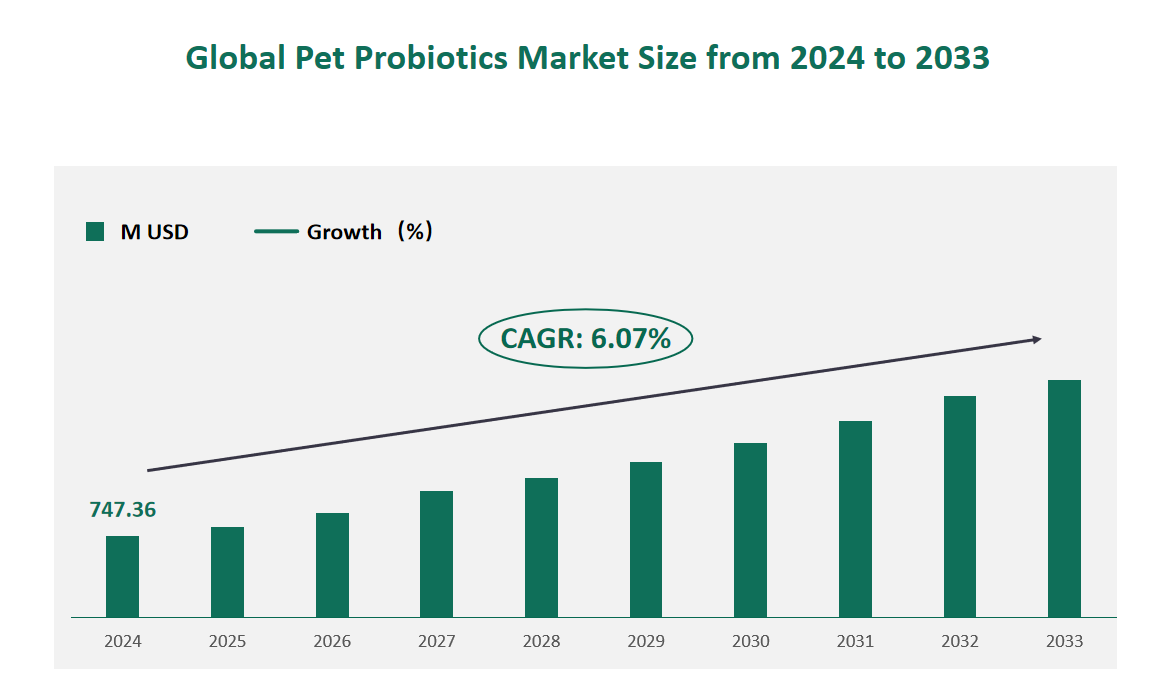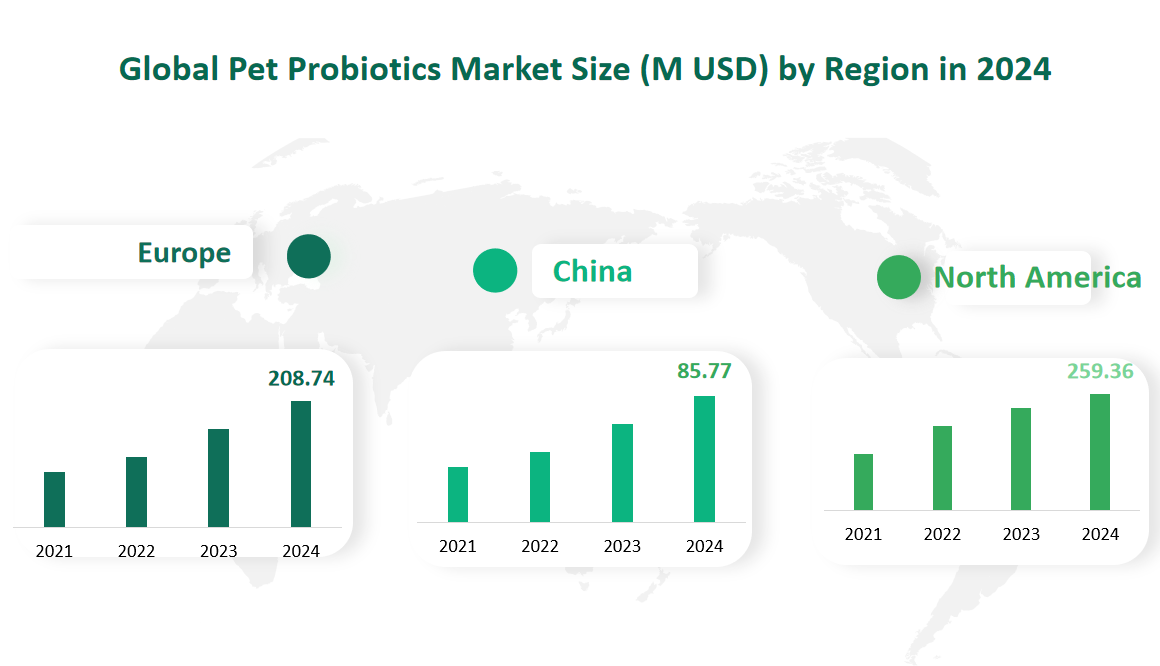1 Global Pet Probiotics Market Size (Value) and CAGR (2024-2033)
In 2024, the global Pet Probiotics market was valued at USD 747.36 million, with a CAGR of 6.07% from 2024 to 2033.
Probiotics are a kind of beneficial active microorganisms, which are located in the human and animal intestines and reproductive systems, and can produce exact health effects to improve the microecological balance of human and animals, and play a beneficial role in the intestine. Pet probiotics refer to probiotics that are beneficial to pets’ gastrointestinal health and even body health.
Figure Global Pet Probiotics Market Size (M USD) and CAGR 2024-2033

2 Pet Probiotics Market Drivers
One of the primary drivers is the increasing trend of pet humanization, where pets are increasingly regarded as family members. This shift has led to a surge in pet ownership and a corresponding rise in spending on pet products. According to the American Pet Products Association (APPA), the percentage of households owning pets has jumped from 56% in 1988 to 67% in 2020, with dogs and cats being the most popular pets. As a result, pet owners are more willing to invest in high-quality products that promote their pets’ health and well-being.
Another significant driver is the growing awareness of the benefits of probiotics in enhancing pet health.
Pet probiotics are beneficial microorganisms that help improve the microecological balance in pets’ digestive systems, enhance nutrient absorption, and boost immunity. These advantages are particularly important in the context of rising concerns about antibiotic resistance and the desire for natural alternatives to support pet health. The use of probiotics can reduce the reliance on antibiotics, leading to healthier pets and reduced environmental pollution from antibiotic residues.
The pet food industry is also evolving to meet the nutritional needs of pets at different life stages, and pet probiotics play a crucial role in this development. Pet owners are increasingly seeking products that not only meet basic nutritional requirements but also offer additional health benefits. The demand for pet probiotics is further fueled by the growing market for high-quality, complex pet food formulations that support overall health and well-being.
3 Pet Probiotics Market Challenges
One of the primary challenges is the rising cost of energy, which directly impacts the production and operational costs of pet probiotics. The global energy market has been affected by geopolitical events, such as the conflict between Russia and Ukraine, leading to a 40% increase in liquefied natural gas (LNG) prices and higher crude oil costs. These rising energy costs are making it more difficult for manufacturers to control costs and manage inventory effectively.
Another significant challenge is the time-consuming process of new product launches. Pet probiotics, while offering numerous health benefits, require extensive testing and validation before they can be widely adopted by the pet care industry. The market promotion of new probiotic products involves a gradual process of trial and evaluation by pet owners and industry stakeholders. This slow adoption rate can limit the immediate growth potential of the market.
Technical barriers also pose a significant challenge to the pet probiotics industry. The production of high-quality probiotics involves complex processes, from the isolation and screening of strains to the industrial application and storage of the final product. Advanced technologies such as genomics, transcriptomics, and proteomics are required to analyze the molecular mechanisms of probiotic strains. Additionally, industrial application technologies like high-density fermentation, cryoprotection, microencapsulation, and activity retention are essential for efficient production. These technical requirements create a high barrier to entry for new players and necessitate significant investment in research and development.
4 Global Pet Probiotics Market Size and Share by Type in 2024
In 2024, the market is expected to be dominated by several key types of pet probiotics, each contributing to the overall market value based on their unique characteristics and applications. The largest segment is expected to be Lactobacillus Acidophilus, with a market value of 185.04 million USD. Lactobacillus acidophilus is a type of beneficial bacteria commonly found in the digestive tract of humans and animals. It is known for its ability to promote the growth of good bacteria, enhance digestion, and prevent gastrointestinal issues in pets. This strain is particularly effective in maintaining a healthy gut environment, making it a popular choice for pet owners concerned about their pets’ digestive health.
Following closely is Lactobacillus Casei, with a market value of 146.70 million USD. Lactobacillus casei is a Gram-positive, nonmotile bacterium that plays a crucial role in maintaining a healthy microbiome. It is often used in probiotic formulations due to its ability to survive in the harsh conditions of the stomach and intestines, providing long-term benefits for pets’ digestive health. This strain is particularly beneficial for pets that require additional support for their digestive systems, such as during dietary changes or after antibiotic treatment.
Another significant segment is Bifidobacterium Breve, with a market value of 112.21 million USD. Bifidobacterium breve is a Gram-positive, anaerobic, rod-shaped bacterium that forms branches with neighboring organisms. This strain is known for its ability to improve gut health by inhibiting the growth of harmful bacteria and supporting the immune system in pets. It is particularly effective in enhancing overall gut health and preventing infections, making it a valuable addition to pet probiotic formulations.
Table Global Pet Probiotics Market Size and Share by Type in 2024
Type | Market Size (M USD) 2024 | Market Share 2024 |
Lactobacillus Acidophilus | 185.04 | 24.76% |
Lactobacillus Casei | 146.70 | 19.63% |
Bifidobacterium Breve | 112.21 | 15.01% |
Enterococcus Faecium | 82.38 | 11.02% |
Bifidobacterium Lactis | 78.68 | 10.53% |
Others | 117.51 | 15.72% |
5 Global Pet Probiotics Market Size and Share by Application in 2024
The largest application segment is the Immune System, with a market value of 429.78 million USD. Pet probiotics play a crucial role in boosting the immune system of animals, helping them fight off infections and maintain overall health. Probiotics enhance the gut microbiome, which is essential for a robust immune response. This segment is driven by pet owners’ increasing awareness of the importance of immune health and the desire to keep their pets healthy and resilient against diseases.
The Infectious Diseases segment is valued at 167.50 million USD. Pet probiotics are used to manage and prevent infectious diseases by maintaining a balanced gut microbiota. These beneficial microorganisms help in reducing the risk of infections and supporting the recovery process. This segment is particularly important for pets with compromised immune systems or those recovering from illnesses.
The Geriatric Care segment is valued at 150.08 million USD. As pets age, their health needs change, and probiotics offer support for senior pets by improving digestion, enhancing nutrient absorption, and boosting overall health. This segment is driven by the growing population of senior pets and the increasing demand for specialized care to ensure their well-being.
Table Global Pet Probiotics Market Size and Share by Application in 2024
Application | Market Size (M USD) 2024 | Market Share 2024 |
Immune System | 429.78 | 57.51% |
Infectious Diseases | 167.50 | 22.41% |
Geriatric Care | 150.08 | 20.08% |
6 Global Pet Probiotics Market Size by Region in 2024
The global pet probiotics market is also segmented by region, with North America and Europe leading in market value. In 2024, North America is expected to hold the largest share, valued at 259.36 million USD. The United States is a major contributor to this segment, driven by high pet ownership rates, advanced veterinary care, and a strong preference for high-quality pet products. The market in North America is also supported by technological advancements and a robust distribution network.
Europe follows closely with a market value of 208.74 million USD. The European market is characterized by a high demand for natural and organic pet products, driven by consumer preferences and stringent regulations on pet care. Countries like Germany, the UK, and France are key markets, with a growing trend of pet humanization and increasing spending on pet health.
The Asia-Pacific region is emerging as a significant market, with China and Japan leading the way. China’s market is valued at 85.77 million USD, driven by the growing pet ownership trend and increasing disposable income. Japan’s market is valued at 41.23 million USD, supported by a mature pet care industry and a focus on high-quality pet products.
Figure Global Pet Probiotics Market Size by Region in 2024

7 Major Players in Global Pet Probiotics Market
7.1 Novus International
Company Profile:
Novus International is a leading global provider of health and nutrition solutions for livestock, poultry, and aquaculture. Established in the 1950s and headquartered in the USA, Novus has a global presence, serving customers worldwide. The company is renowned for its innovative products and solutions that enhance animal health and performance.
Business Overview:
Novus International focuses on developing and commercializing products that improve feed quality and optimize nutrient uptake in animals. Their product portfolio includes Methionine solutions, Trace Mineral solutions, Enzyme solutions, and Eubiotics solutions. Novus is committed to sustainability and animal welfare, driving innovation in animal nutrition.
Products Offered:
Novus offers a range of pet probiotics, including the ACIDOMATRIX™ line of Gut Environment Modifiers (GEMs). These products are designed to stabilize the intestinal microflora of production animals, enhancing their ability to maintain effective pathogen control and promoting peak performance during diet changes or in antibiotic-free diets.
Recent Financial Performance:
In the past year, Novus International reported a revenue of 94.26 million USD from pet probiotics, with a gross margin of 60.91%.
7.2 Purina
Company Profile:
Purina, an American subsidiary of Nestlé, is a leading producer of pet food, treats, and cat litter. Established in 1904 and headquartered in St. Louis, Missouri, Purina has a global presence and is known for its high-quality products and innovative solutions.
Business Overview:
Purina is dedicated to improving the lives of pets through nutrition. The company offers a wide range of pet food products, including specialized formulations for different life stages and health conditions. Purina’s commitment to research and development ensures that their products meet the highest standards of quality and efficacy.
Products Offered:
Purina offers several probiotic products, such as PRO PLAN® Canine FortiFlora®, which contains a guaranteed amount of live probiotics (SF68). This product is designed to promote gut health and microbiome balance, supporting a healthy immune system in dogs. Purina also recently launched Calming Care, a probiotic supplement for cats that helps maintain calm behavior.
Recent Financial Performance:
In the past year, Purina reported a revenue of 87.74 million USD from pet probiotics, with a gross margin of 57.90%.
7.3 Koninklijke DSM
Company Profile:
Koninklijke DSM, a Dutch company established in 1902, is a global leader in science-based products and services for animal nutrition and health. Headquartered in the Netherlands, DSM offers a wide range of solutions that enhance animal performance and welfare.
Business Overview:
DSM focuses on developing innovative feed additives and nutritional solutions that support gut health and overall well-being in animals. The company’s products are designed to improve feed efficiency, reduce environmental impact, and enhance animal health. DSM is committed to sustainability and innovation, driving advancements in animal nutrition.
Products Offered:
DSM offers a range of pet probiotics, including Eubiotics, which are designed to support animal performance and welfare by maintaining gut health. These products are essential for modern farming systems, ensuring efficient and sustainable animal production.
Recent Financial Performance:
In the past year, Koninklijke DSM reported a revenue of 76.57 million USD from pet probiotics, with a gross margin of 55.83%.

